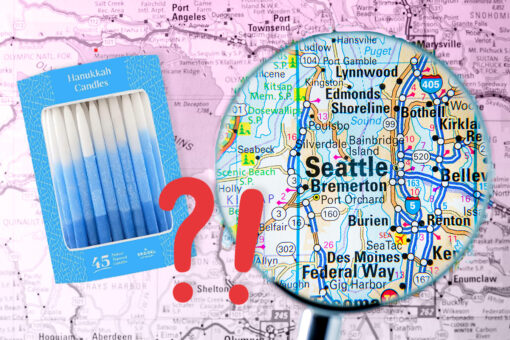Donald Trump has a Jewish daughter and Jewish grandchildren, but guess what? That doesn’t exempt him from using antisemitic tropes. Say it with us: You can have Jewish family members and still be antisemitic.
In February 2017, Trump declared, “I am the least antisemitic person that you’ve ever seen in your entire life.” He added that he is also the “least racist person,” a sentiment he repeated at the final presidential debate with Joe Biden on October 22, 2020.
But let’s focus on the first half of that statement. Trump has repeatedly used antisemitic tropes and dogwhistles in speeches and public appearances. How has he used these dogwhistles, and what exactly do they mean? We’re going to break it down, trope by trope.
Let’s get into it, shall we?
1. Jewish conspiracy
Also known as “Jewish control the world” or “Jews control the banks”
In Trump’s final ad of the 2016 presidential campaign, he leaned heavily on antisemitic tropes of Jews controlling international financial systems and the world.
“The establishment has trillions of dollars at stake in this election,” Trump says. “For those who control the levers of power in Washington and for the global special interests, they partner with these people that don’t have your good in mind.” As that voiceover happens, images of George Soros (a Jewish philanthropist at the heart of many antisemitic conspiracy theories) and Janet Yellen (Jewish chairman of the Federal Reserve) appear — linking “levers of power” with Jewish people.
Trump then discusses the “global power structure that is responsible for the economic decisions that have robbed our working class, stripped our country of its wealth, and put that money into the pockets of a handful of large corporations and political entities.” The image that appears during this segment? Jewish CEO of Goldman Sachs, Lloyd Blankfein.
The audio was taken from a Trump campaign speech in October 2016. As Ron Kampeas wrote in JTA at the time, “Trump delivered a speech… that sounded some familiar themes – familiar to his campaign, but also to folks versed in anti-Semitism and in classic conspiracy theories of global control that is its lifeblood.”
In the speech, along with the above excerpts, he said, “Hillary Clinton meets in secret with international banks to plot the destruction of U.S. sovereignty in order to enrich these global financial powers, her special interest friends and her donors.” He had also tweeted earlier in the campaign that Clinton is the “Most Corrupt Candidate Ever!” on an image of piles of cash and the Star of David. Literally textbook antisemitism.
All of this rhetoric rings classic antisemitism bells — “international banks,” “plot the destruction,” “global financial powers” — and it calls to mind the most famous antisemitic document of all time, The Protocols of the Elders of Zion. (Here you can see a side-by-side of the speech and the Protocols.)
2. Globalists
This is essentially the same as #1. In this form of antisemitism, one doesn’t have to name Jews as “Jews.” Rather, one can use widely accepted antisemitic code words: “International bankers,” “global financial powers,” “special interests,” etc. (all of which appeared in Trump’s speech). Thus, in 2016, when Trump “ended his campaign insinuating that a secret cabal is controlling the global economy for nefarious purposes – and who has identified the cabal with three Jewish figures,” it was clearly crossing the line into antisemitism.
This came back in the 2020 campaign, obviously. Trump has said, repeatedly, that Biden is controlled by “the globalists.” At an October 2020 rally in North Carolina, he said Biden was “a servant of the globalists and wealthy donors and special interests who got rich bleeding your country dry, taking jobs from North Carolina.”
In recent years, globalist has become a common code word for Jew.
3. Dual Loyalty
Of course, Trump’s penchant for using antisemitic tropes did not magically end once he took office. One trope that has popped up again and again is the idea of dual loyalty.
According to the ADL, dual loyalty, also referred to as disloyalty, is the idea that Jews are “holding allegiance only to fellow Jews and to a uniquely Jewish agenda. Jews are accordingly seen as untrustworthy neighbors and citizens, as if they are inherently disloyal — or have inherently dual loyalties.” This is often expressed as American Jews having loyalty not to America, but to Israel.
In 2018, at the White House’s Hanukkah party, Trump told the gathered group of American Jews that Israel is “your country.” The full quote comes from his introduction of Vice President Mike Pence: “I want to thank Vice President Mike Pence. A tremendous supporter… a tremendous supporter of yours. And Karen. And they go there and they love your country. They love your country. And they love this country. That’s a good combination, right?”
Your country in this statement is Israel — not America — even though he is speaking to a room of American Jews, not Israeli Jews.
(Pence has also had his fair share of antisemitic controversies; just two days after the Pittsburgh synagogue shooting in 2018, he invited a Christian “Rabbi,” AKA a Messianic Jew, AKA not a Jewish person, to give the opening prayer. That “rabbi” had recently written a blog post about how Jews who don’t accept Jesus will burn in hell. Cool cool cool.)
But back to Trump and dual loyalty. He’s brought up the idea of “your country” or “your prime minister” multiple times to American Jews. At the 2016 Republican Jewish Coalition, he referred to Israeli Prime Minister Benjamin Netanyahu as “your” prime minister. On a Rosh Hashanah call in 2020, he said to American Jewish leaders: “We really appreciate you. We love your country also.”
Say it with us: The country to which American Jews belong is America.
In 2019, Trump took it one step further, saying that “I think Jewish people that vote for a Democrat — I think it shows either a total lack of knowledge or great disloyalty.” By arguing that American Jews who vote Democrat are “disloyal,” he is operating on the assumption that (1) American Jews are loyal to Israel over America and (2) the Republicans are better for Israel than the Democrats.
As a reminder, American Jews support Democratic candidates by an overwhelming majority, and Jewish voters tend to rank foreign policy (including Israel) low on their list of voting priorities.
4. Greedy Jews
At the 2015 Republican Jewish Coalition, Trump said: “I’m a negotiator like you folks, we are negotiators. Is there anybody that doesn’t renegotiate deals in this room? This room negotiates them — perhaps more than any other room I’ve ever spoken in.”
One of the most common antisemitic tropes is that of greed. According to the ADL, this trope believes “that [Jews] are greedy and avaricious, hoping to make themselves rich by any means. They are seen both as relentless in the pursuit of wealth and also as stingy misers determined not to let any money slip from their grasp.”
In December 2019, Trump repeated this — again, to a room full of American Jews — saying, “A lot of you are in the real estate business, because I know you very well. You’re brutal killers, not nice people at all.”
SO MUCH FUN to call Jews “brutal killers”! Yes I am being very sarcastic, it’s awful!
He continued, “Some of you don’t like me. Some of you I don’t like at all, actually. And you’re going to be my biggest supporters because you’re going to be out of business in about 15 minutes if they get [the wealth tax]. So I don’t have to spend a lot of time on that.”
Once again, Trump is picking up on the idea that Jews are wealthy, cheap, and greedy — age-old antisemitic stereotypes.
5. Jews control politicians/the government
Later at that 2015 RJC event, Trump said, “You’re not gonna support me because I don’t want your money. You want to control your politicians, that’s fine.”
He was essentially saying he wasn’t popular with Jews because he could not be bought? Which, uh, is probably not why he’s not popular with Jews.
This comment seems to suggest that Jews buy off politicians to work in their interests, which is reminiscent of #1 on this list — Jewish conspiracy — but also hints at an antisemitic trope called the “Zionist occupation government” (ZOG), which “reflects the common white supremacist belief that the U.S. government is controlled by Jews.”
6. Jewish deception
Let’s flash back to 2013. Trump, then just a reality TV star, took to Twitter to attack Jon Stewart.
I promise you that I'm much smarter than Jonathan Leibowitz – I mean Jon Stewart @TheDailyShow. Who, by the way, is totally overrated.
— Donald J. Trump (@realDonaldTrump) April 24, 2013
And again, a month later:
If Jon Stewart is so above it all & legit, why did he change his name from Jonathan Leibowitz? He should be proud of his heritage!
— Donald J. Trump (@realDonaldTrump) May 3, 2013
Jon Stewart @TheDailyShow is a total phony –he should cherish his past—not run from it.
— Donald J. Trump (@realDonaldTrump) May 3, 2013
You see how he keeps referring to Stewart as Jonathan Leibowitz? Trump is insinuating that Stewart, a Jewish comedian born Jonathan Leibowitz, changed his name to hide his Jewish identity. Those sneaky Jews!
“So, I start to think to myself: Oh, I think this guy is trying to let people know I’m a Jew. And I think to myself, ‘Doesn’t my face do that?’” Stewart recalled of the incident in 2016. “Honestly! Where have you seen this face other than a poster for Yentl? In what world are people like, ‘Stewart? That’s a Scottish name! But there’s something about that fella that looks a little schmear-y.’ It would be funny if it wasn’t so toxically fuckin’ crude and horrible.”
7. George Soros
How could we go through an explainer on antisemitism without discussing George Soros, the bogeyman of the alt-right and center of so many antisemitic conspiracy theories? We couldn’t!
Soros, a Holocaust survivor who went on to become one of the most successful investors in the U.S., is a left-leaning Jewish philanthropist at the center of many antisemitic conspiracy theories, including the idea that he’s paying Black Lives Matter and other liberal protestors, funding antifa, and acting as a “puppet master” secretly controlling global economics and policy. (Read everything you need to know about the antisemitic George Soros conspiracies here.)
In a 2018 tweet, Trump blamed the people protesting Brett Kavanaugh’s Supreme Court confirmation hearing on George Soros, a completely false and baseless claim:
The very rude elevator screamers are paid professionals only looking to make Senators look bad. Don’t fall for it! Also, look at all of the professionally made identical signs. Paid for by Soros and others. These are not signs made in the basement from love! #Troublemakers
— Donald J. Trump (@realDonaldTrump) October 5, 2018
Trump also suggested that Soros was funding a migrant caravan to the U.S. in 2018.
(Sidenote: We’re not going to even get into how much Donald Trump Jr. tweets about Soros, specifically about how he is a Nazi. Say it with us: George Soros is not a Nazi. He is literally a Holocaust survivor.)
8. Refusing to condemn neo-Nazis
And let’s just end with the reminder that Donald Trump has repeatedly refused to condemn neo-Nazis. He did so with the marchers in Charlottesville who chanted “Jews will not replace us,” instead saying there were “very fine people on both sides.” He refused to condemn the Proud Boys at the first 2020 presidential debate, instead telling them to “stand back and stand by.” And at his NBC town hall, under fire for his past avoidance, he denounced white supremacy but still failed to condemn Qanon, an antisemitic conspiracy theory that’s taken root in the minds of many of his supporters.
Header image design by Emily Burack. Photos of Trump by SAUL LOEB/AFP via Getty Images.



